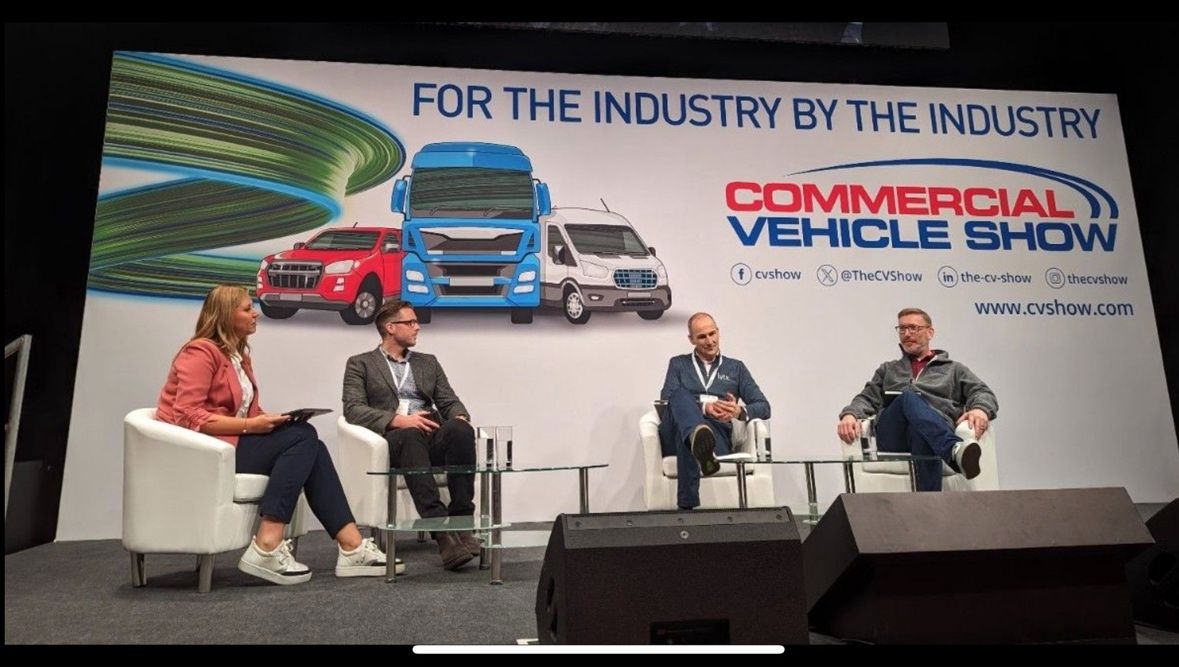Creating a Virtuous Circle of Safety, Productivity and Financial Savings: Learnings from the CV Show

At Lytx, we’re all about using intelligent video to improve road safety. That’s why we attended this year’s Commercial Vehicle Show to talk about safety, sustainability and the industry’s most vital resource – its people.
The show is a three-day event that gathers leaders from across the transport sector to discuss the most pressing issues affecting commercial fleets. We led a series of discussions that explored how artificial intelligence (AI) is helping to create a virtuous circle of safety, productivity and financial savings.
Joining us across the sessions were: Daniel Mc Guigan, EHS Director in global operations at PepsiCo; Michael Tansey, UK fleet practice lead at RSA; and Oliver Holt and Abhinav Vasu from Geotab.
Here are three of the key points that emerged:
1. Proactive technology is helping drivers stay safe
All our panellists agreed that fleets are changing the way they use technology and focusing on systems that can help them to protect drivers and improve standards of driving.
For Daniel Mc Guigan, intelligent video has transformed PepsiCo’s approach from reactive to proactive. He told the audience about an instance where, according to the company’s previous telematics system, a driver appeared to be driving safely. The system only identified G-force triggers and didn’t spot risk because the driver was travelling in a straight line with no sharp braking or swerving. It was only with the addition of intelligent dash cams, equipped with AI, that the team could see that the driver was steering with his knees while snacking from a fruit bowl. Should the driver have been involved in an accident, traditional telematics would have offered no insight into what led to it. With an understanding of exactly what’s happening in the cab, fleet managers can focus on offering drivers the training they need.
More than this, AI is helping to prevent collisions from happening by alerting drivers to risk. For instance, if a driver forgets to fasten their seatbelt, the technology will emit an alert, giving the driver the opportunity to self-correct before a potential incident occurs. As Damian Penny, VP EMEA at Lytx, explained, this is helping to speed up the ‘Time-to-Action’ (T2A) by empowering drivers with tools that can help them to get ahead of risk and act immediately.
2. AI is reducing risk… and costs
For Michael Tansey, UK fleet practice lead at insurance company RSA, proactive technologies are also helping to lower costs. He explained that the data derived from intelligent video is transforming how fleet risk calculations are made and helping insurers to assess premiums more accurately. For fleets, this is creating significant financial savings via lower premiums and lower claims. Video also offers fleets and drivers protection from spurious claims, saving time and money for both sides. As the benefits of this technology are recognised, insurance companies are also contributing towards the cost of it.
Oliver Holt at Geotab echoed this and shared how accurate and actionable data has helped Dipesa Group, a private transport company based in Ibiza. Without reliable evidence, Dipesa was struggling to rectify driving issues and respond to insurance claims when accidents occurred. Since implementing intelligent dash cams last year, however, the company has seen a 10% reduction in collisions and is also able to resolve insurance claims much more quickly and simply.
3. Co-opetition and the potential of open data
Our panellists also spoke about where these technologies are heading next and how the industry can work more closely to improve safety. One thing that Daniel Mc Guigan at PepsiCo is hoping to see in the near-distant future is the sharing of data for the greater good. For example, data might indicate that an area of road has flooded after heavy rain. Currently, a driver travelling on that route can alert the fleet manager and action taken to re-route the fleet. But what if this insight could be shared with every commercial vehicle on the road?
At Lytx, we’re currently trialling some of the ways this could work in practice – including how fleet managers can tap into the road-facing cameras of participating vehicles in other organisations to identify route risks such as debris, severe weather or potholes. This information could then be shared with other fleets and drivers who can be forewarned and seek alternative routes.
While the discussion demonstrated a clear link between using intelligent dash cams to anticipate risk and improve safety, we’re now seeing fleets, drivers and insurers use this technology to do more. Whether it’s reducing insurance claims and the costs associated with a collision, or time saved reviewing data and insights, video is helping companies to bring improvements across profit, productivity and people.
To listen to the session recordings in full, head to our resources pages:
- Video Telematics and Reducing Insurance Premiums: in conversation with Simon Dicks, insurance channel manager at Lytx, Michael Tansey, UK fleet practice lead at RSA and Abhinav Vasu, associate VP, solutions engineering EMEA Geotab.
- AI-powered Safety, Productivity and Profit: in conversation with Damian Penney, VP EMEA at Lytx, Daniel Mc Guigan, EHS Director in global operations at PepsiCo and Oliver Holt, sales manager UK&I Geotab.
To find out how your fleet can get ahead of risk, contact Tony Papas at tony.papas@lytx.com
